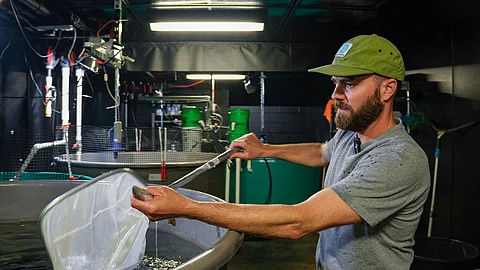

Minnesota Sea Grant Aquaculture Extension Associate Kieran Smith monitors Yellow Perch for a project that is growing fish from egg to market size in a recirculating aquaculture system.
Image credit: Cait Dettmann /MNSG.
A new report released by Minnesota Sea Grant aims to support the local aquaculture community by offering much-needed clarity on the often-confusing regulatory landscape faced by fish farmers in the USA's Great Lakes region.
The newly-published report, Aquaculture Regulation in the Great Lakes, gives a comprehensive overview of state-level laws, permitting requirements, and environmental regulations affecting aquaculture across the eight Great Lakes states and Lake Champlain. The report is a product of a collaboration between the National Sea Grant Law Center and the Minnesota Sea Grant-led Great Lakes Aquaculture Collaborative (GLAC).
"Understanding the regulatory landscape is crucial for the growth and sustainability of aquaculture in the Great Lakes region," said Amy Schrank, Minnesota Sea Grant extension leader and GLAC project lead, in a press release.
“This publication serves as a valuable resource for fish farmers and policymakers to navigate a complex legal environment and identify opportunities for harmonization and improvement," Schrank added.
The report analyzes key legal aspects such as approved species, health requirements, water use, pollutant discharge, and right-to-farm laws. It also identifies regulatory gaps and inconsistencies that may pose challenges to aquaculture operations, Minnesota Sea Grant said.
By breaking down these complex frameworks, the report aims to enable fish farmers, regulators, and other stakeholders to make informed decisions that support environmentally responsible and economically viable aquaculture in the region.
The full report and additional resources are available on the Sea Grant Great Lakes Aquaculture Collaborative webpage.
Minnesota Sea Grant is a systemwide program of the University of Minnesota and one of 34 federal-university partnerships in the National Sea Grant College Program, supported by the National Oceanic and Atmospheric Administration (NOAA). Its mission is to enhance the state's coastal and aquatic resources through research, education, and outreach.
